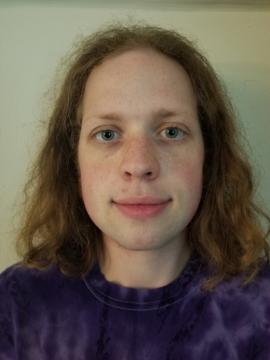Isaiah Richardson
By Tiffany Whitfield
When COVID-19 forced Old Dominion University to quickly pivot to remote learning in spring 2020, Physics senior Isaiah Richardson's laboratory research stopped. "ODU shut down in March, so I could not go to ODU and complete the senior thesis experiment," said Richardson. Although he could have simply reported progress to date and closed out the project that spring, Isaiah instead chose to continue working on the research and resumed his experiment when the lab reopened in the Fall. Time has always captivated Richardson and he used his last semester to acquire additional data for his thesis and to fully prepare for his future in physics.
"Time travel was actually the original reason why I chose to pursue physics," said Richardson. He understands the skepticism behind it. A lot of people just say, "it's impossible" or "it has paradoxes so it cannot work" and write time travel off. "Now that I know I want to be an experimentalist, maybe I can be the first to invent the time machine," said Richardson. "Who knows?" He's always found "the intricacies of time travel interesting and felt a lot of good can be done for the world."
With an additional semester, Richardson took time to concentrate on applying to graduate schools and complete his senior thesis on laser stabilization techniques to atomic transitions of rubidium. "We use lasers to produce absorption or emission spectra for a particular atom in order to study the structure of the atom," said Richardson. The experiment Richardson pursued was to investigate several laser spectroscopic techniques applied to probing rubidium atoms inside a glass vapor cell. The techniques he studied can be used as a means to stabilize lasers to a specific wavelength with high precision. He worked diligently to get the senior thesis paper completed in time for graduation this fall.
The time Richardson has had a ODU involved plenty of experiments and research. "At ODU I've learned more advanced topics in physics, and I was more interested in the field as a whole," said Richardson. Richardson has had two mentors from the Department of Physics who changed the trajectory of his studies. Dr. Charles Sukenik, Professor and Chair of the Department of Physics and the late Dr. Mark Havey, Professor of Physics, were the two professors that had the most impact on his learning experience. "I know both of them care about teaching students to succeed in physics," said Richardson.
Dr. Havey taught a physics class about electricity and magnetism, and "this was easily my favorite class I have ever taken at ODU or anywhere period". His teaching style consisted of a short lecture (15-30min) with the rest of the class and the recitation doing problems. "It forced me to read the book and learn on my own while getting plenty of experience with solving problems which ends up teaching you the most about physics," said Richardson. "It also made me work with other students and forge my first friendships at ODU with other students in the class." His time in Havey's class helped Richardson grow intellectually and prepare for research. Dr. Havey also wrote Richardson's letter of recommendation for the Texas A&M Research Experience for Undergraduates (REU) and advised him to apply. "He was going to be my letter-writer again for graduate school, but passed away before I could ask him," said Richardson. "I pray he rests in peace and he will be remembered for inspiring others to pursue physics even when they feel they cannot do so and performing great atomic physics."
Thanks to Dr. Havey's letter of recommendation along with Richardson's hard work, he was accepted into the Texas A&M REU in the Summer of 2019. He studied Nuclear Astro-physics of radioactive beam production and separation using the K500 cyclotron and the Momentum Achromat Recoil Spectrometer (MARS). "We wanted to see what target could make the most of the 35,36Ca proton-rich nuclei at our beam strength," said Richardson. He presented his research at the Division of Nuclear Physics CEU 2019 and Physcon 2019. While at Texas A&M REU, Richardson also worked with an accelerator similar to the ones in Japan. "I felt my dream to experience Japan while doing particle/nuclear physics may be achievable," said Richardson. "Japan actually does a great variety of physics research like neutrinos in Japan's Super-Kamiokande neutrino detector." Richardson wants to eventually move to Japan to work in physics. "I have always been inspired by Japanese culture throughout my life in television series and art," said Richardson. "I want to experience life in Japan and learn more about their society, culture, and history." Currently, he is learning the Japanese language on his own.
This year Richardson considered Dr. Sukenik as his "second advisor" because he helped him with the application process for graduate school and completing his atomic physics research. "I am indebted to him for allowing me to conduct research with him even without much time to spare," said Richardson. "Isaiah did a great job in the lab and put considerable effort into understanding, in detail, all of the physics that formed the foundation of his research project," said Dr. Sukenik. "I have no doubt that he is going to be very successful in graduate school next year." Richardson's time spent learning from Dr. Sukenik and the late Dr. Havey has paid off. "Their help and advice over the years have been invaluable for my success, and I honestly feel without them I would not have made it through all the way to graduating," Richardson added. "
"At ODU, the learning experience is in the student's hands," said Richardson. "Take what you can out of the experience and enjoy it." Currently, he is applying to graduate school with hopes to obtain a Ph.D. in physics. "From there I want to work at a national lab hopefully one in Japan," said Richardson.




